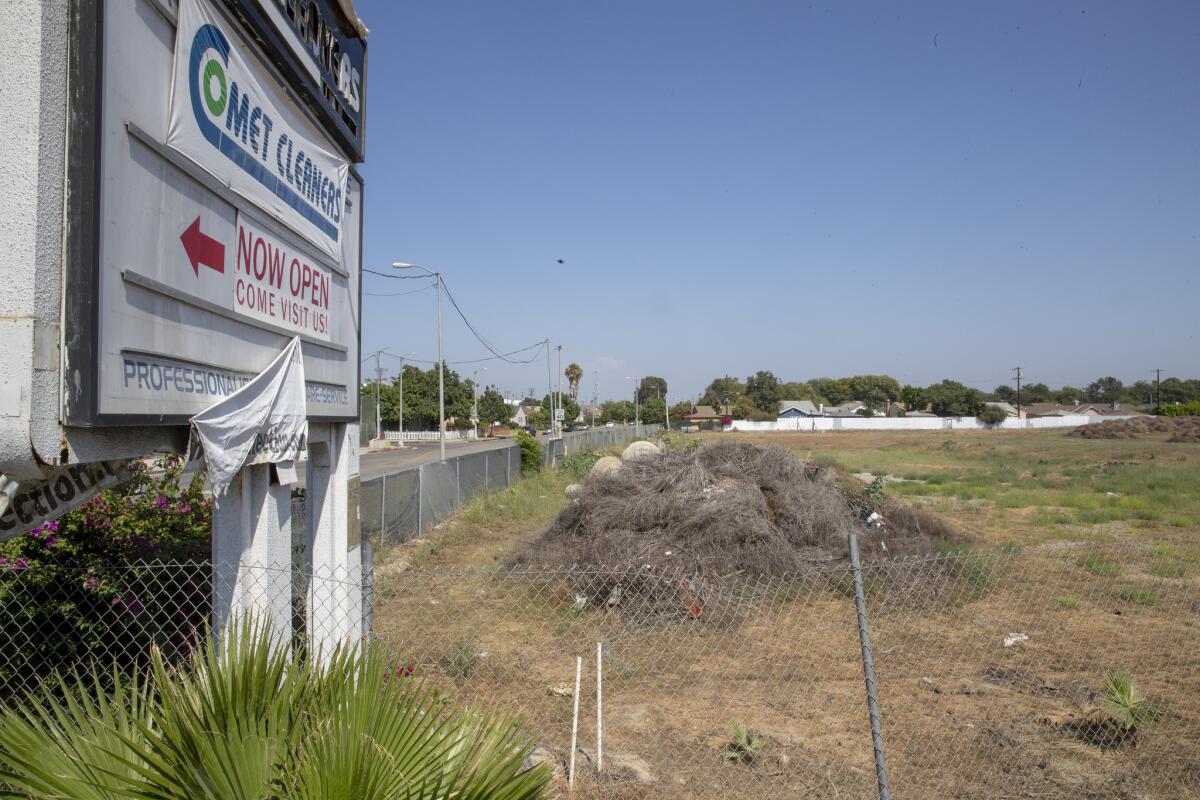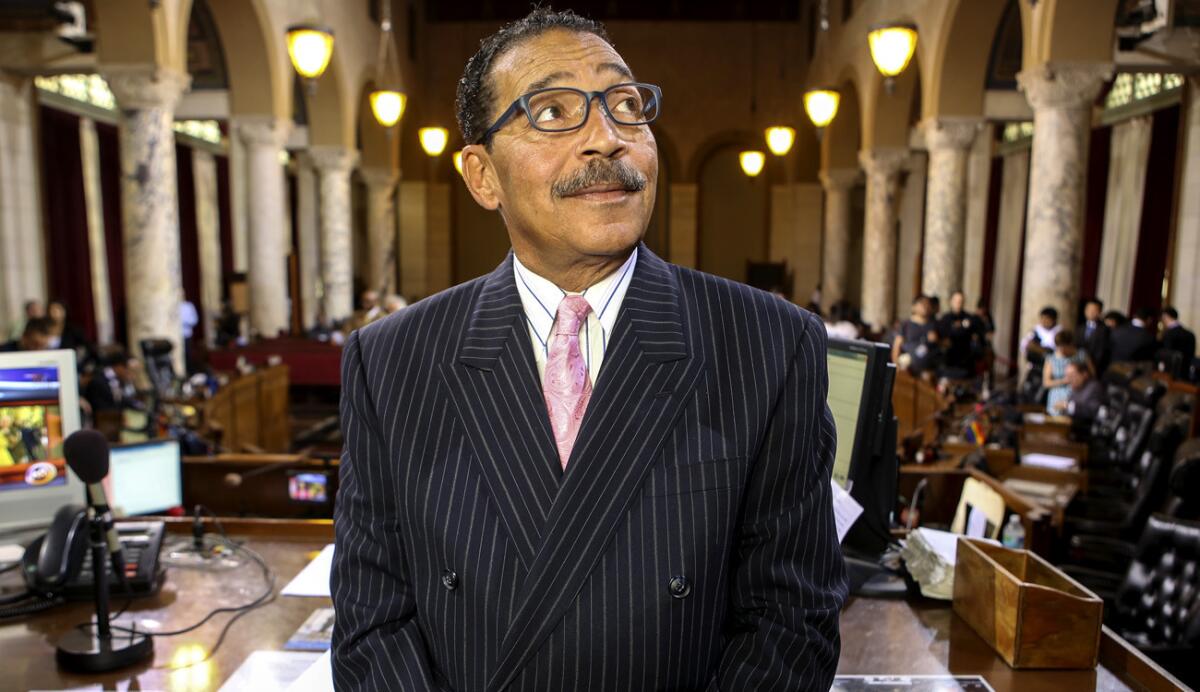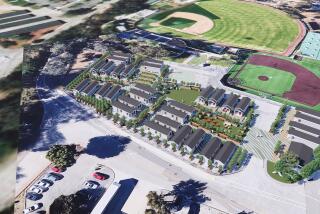L.A.’s rejection of a 577-unit housing project violated state law, judge finds
A Superior Court judge has ordered the city of Los Angeles to give the go-ahead to a 577-unit residential complex planned in South L.A., saying its previous decision to reject the six-story project violated state housing law.
The South Los Angeles Area Planning Commission, which is made up of appointees of Mayor Eric Garcetti, turned down a developer’s request to build the mixed-use project last year, saying it lacked affordable housing and would spur gentrification. Superior Court Judge James C. Chalfant offered a scathing assessment of that decision, saying the panel “clearly acted in bad faith.”
In his ruling, Chalfant said the commissioners disregarded advice from their own lawyer, who publicly warned them that the reasons for their decision were too vague and would not comply with the Housing Accountability Act, which bars cities from rejecting residential projects that comply with planning and zoning rules, unless there is an unavoidable threat to public health or safety.
That state law was written to ensure that local governments do not drive up housing costs by applying “subjective” criteria to residential projects that comply with zoning rules, Chalfant said in his 21-page ruling.
“That is exactly what the [commission] did by imposing its own views that gentrification is bad ... and the need for affordable housing trumps all,” the judge wrote. “That is not the law, and there can be no legitimate dispute that the [commission] acted knowingly and deliberately to violate the law.”
The commission is scheduled to take up the project, which is known as District Square, again on Tuesday.
Chalfant’s ruling delivered a major setback to activists who have been mobilizing against market-rate housing in South L.A., arguing that such projects will spur other landlords to sell, redevelop their properties or jack up rents. Worries about gentrification have also fueled criticism of such projects as the Reef, the Cumulus District and the redevelopment of Baldwin Hills Crenshaw Plaza.
Damien Goodmon, who filed one of the challenges to District Square last year, said he wants city leaders to file an appeal. Lori Higgins, whose home abuts the District Square site, said she would probably sell her house if the project is approved.
“We’re going to be eclipsed by these buildings,” said Higgins, who waged her own challenge against District Square last year. “They’re next to single-family homes. We’re going to have people looking down in our yards.”
Rob Wilcox, a spokesman for City Atty. Mike Feuer, said his office is reviewing its options. Garcetti spokesman Alex Comisar said in an email that the city will “take the actions necessary to comply with the court’s order.”

Lawyers for District Square LLC, the project’s developer, declined comment. In their lawsuit, they said that city planning rules do not require any affordable housing on the District Square site, which is planning on an empty lot next to a Crenshaw Boulevard light rail station.
When the commission took up the project, District Square LLC offered to voluntarily include 63 “workforce” units — the most expensive tier of affordable housing for renters, targeting those who earn 150% of the area’s median income — into the project.
Chalfant’s ruling, which was finalized last month, represents yet another sharp turn for a project with a tangled history at City Hall. Councilman Herb Wesson, who represents the area, supported District Square a decade ago when it was envisioned as a two-story shopping center, helping the developer secure more than $26 million in city financial assistance.
The shopping center project stalled and the developers racked up a series of defaults on their government loans. But they eventually worked with Garcetti’s office to redesign the project, making it much taller and incorporating hundreds of residential units. A revised application for District Square was submitted in February 2019.
By then, Arman Gabay, one of the project’s original developers, had been charged in an unrelated federal bribery case. Gabay pleaded not guilty and Wesson, who had launched a bid for county supervisor, came out against the redesigned District Square, saying it would drive up rents and force out longtime renters.
In November 2019, the commission sided with Wesson and a room full of residents and activists, who argued that the project was too tall, lacked affordable housing and would cause housing prices to climb.
Still, Deputy City Atty. Parissh Knox advised the commissioners that they could not reject the project without showing documented evidence of a threat to public health and safety. At one point in their meeting, Knox suggested the panel take a break so that city staffers could work on the legal findings needed to buttress the commissioners’ views.

Garcetti’s commissioners did not stop the meeting, voicing their concerns about gentrification and affordable housing.
“No matter what the laws that are written,” said Commissioner Antoinette Anderson, “you have to be about the people.”
In his decision, Chalfant said the commission should have applied the law to its evaluation of the project. Instead, the panel acted “on its own frolic and detour,” imposing its own public policy views on gentrification and other issues.
The judge also criticized the Department of City Planning, saying staffers failed to complete a determination letter on the commission’s decision within the legal deadline. That letter, he said, did not accurately describe the commission’s rationale for rejecting District Square.
The document summarizing the rejection of District Square is “merely a staffer’s opinion of what the [commission] did and therefore is irrelevant,” the judge added.
Asked about the judge’s criticism, a planning department spokeswoman said the city’s letter “reflected the necessary findings required by the city’s municipal code and the state’s public resources code.”
More to Read
Sign up for Essential California
The most important California stories and recommendations in your inbox every morning.
You may occasionally receive promotional content from the Los Angeles Times.











